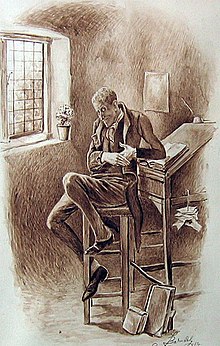Uriah Heep
| Uriah Heep | |
|---|---|
| David Copperfield character | |

Drawing by Fred Barnard
|
|
| Created by | Charles Dickens |
| Information | |
| Gender | Male |
| Occupation | Lawyer |
| Family | Mrs. Heep (mother) |
| Nationality | British |
Uriah Heep is a fictional character created by Charles Dickens in his novel David Copperfield.
The character is notable for his cloying humility, obsequiousness, and insincerity, making frequent references to his own "'umbleness". His name has become synonymous with being a sycophant. He is one of the main antagonists of the book.
David first meets the 15-year-old Heep when he comes to live with Mr Wickfield and his daughter Agnes, in chapter 15:
[Heep's face] was quite as cadaverous as it had looked in the window, though in the grain of it there was that tinge of red which is sometimes to be observed in the skins of red-haired people. It belonged to a red-haired person—a youth of fifteen, as I take it now, but looking much older—whose hair was cropped as close as the closest stubble; who had hardly any eyebrows, and no eyelashes, and eyes of a red-brown, so unsheltered and unshaded, that I remember wondering how he went to sleep. He was high-shouldered and bony; dressed in decent black, with a white wisp of a neckcloth; buttoned up to the throat; and had a long, lank, skeleton hand, which particularly attracted my attention, as he stood at the pony's head, rubbing his chin with it, and looking up at us in the chaise.
Much of David Copperfield is autobiographical and some scholars believe Heep's mannerisms and physical attributes to be based on Hans Christian Andersen, whom Dickens met shortly before writing the novel. Uriah Heep's schemes and behaviour are more likely based on Thomas Powell, employee of a friend of Dickens, Thomas Chapman. Powell "...ingratiated himself into the Dickens household" and was discovered to be a forger and a thief, having embezzled £10,000 from his employer. He later attacked Dickens in pamphlets, calling particular attention to Dickens' social class and background.
The characteristics of grasping manipulation and insincerity can lead to a person being labelled "a Uriah Heep" as Lyndon Johnson is called in Robert Caro's biography The Years of Lyndon Johnson. Seymour Fleming, a character in the play Babes in Arms, is also called thus. Author Philip Roth once compared President Richard Nixon to Uriah Heep. More recently, historian Tony Judt used the term to describe Marshal Philippe Pétain of the French Vichy government. Pakistani-British historian and leftist political commentator Tariq Ali likened Pakistani dictator Muhammad Zia-ul-Haq to the character. Late Australian journalist Padraic (Paddy) McGuinness writing in the Australian Financial Review referred to former Australian Prime Minister Paul Keating as Uriah Heep, after a fawning interview on ABC television in which Mr Keating, the owner of extensive real estate holdings and a man generally acknowledged to have a robust ego, affected great humility.
...
Wikipedia
